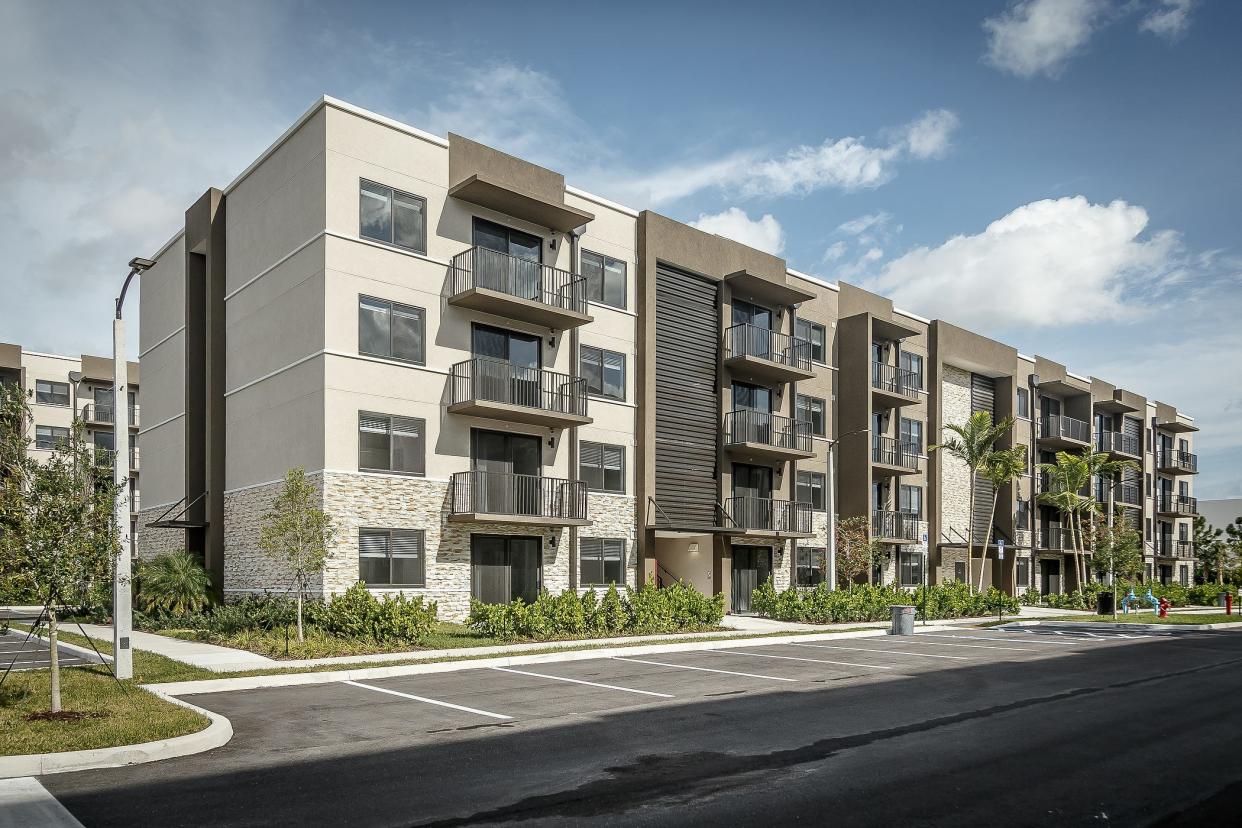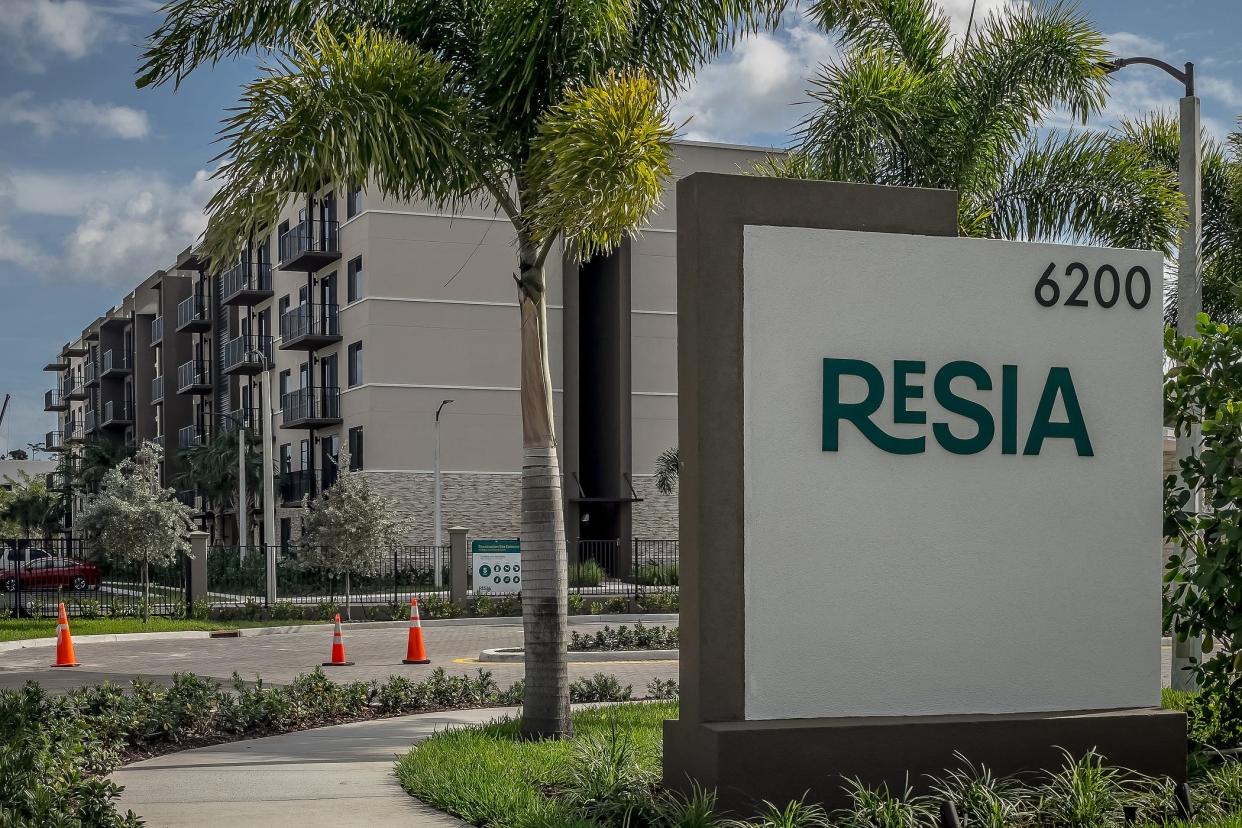Middle-class workers in affordable housing overcharged by thousands of dollars
Palm Beach County’s largest workforce housing site overcharged dozens of tenants by a total of more than $40,000 in its first six months of operation, the latest apartment complex to violate county rules protecting middle-class renters in a fast-rising real estate market.
Pine Ridge, a 288-unit apartment complex west of West Palm Beach, opened its doors in January, promising affordable rents in a glistening new community off Southern Boulevard.
But the community’s property managers immediately began charging some tenants higher rents than permitted under the rules of the county government’s workforce housing program, county records show.
In some cases, records show tenants were overcharged by more than $500 a month.
County government officials said they began alerting the property owner, Resia, to the overcharges in March, but records show that the problems continued. In June, the county gave Resia an ultimatum to compensate the tenants and correct its rental policies to comply with county rules.
You might be surprised: Do you qualify for workforce housing in Palm Beach County?

The Miami-based company, which recently sold the property, said tenants now have been credited and the property was “fully compliant” before the sale. Three tenants confirmed this week that they had received refunds.
Resia blamed the overcharges on a “miscalculation” that affected a “small number” of units.
“An oversight of the agreement between Resia and Palm Beach County led to a miscalculation in the monthly rent of a small number of residents,” the company said in a statement. “Once brought to our attention, Resia immediately applied a rent credit to those impacted.”
County records obtained through a public records request show the overcharges were extensive. Administrators in June identified 32 tenants as potentially overcharged, more than a third of the 73 units reported as leased by that point.
Breaks for developers: County caved repeatedly on housing for workers. Now it’s a crisis.

The scope of the overcharges and the length of time required to address them underscore the complications county officials face in enforcing rules governing the county’s growing number of workforce housing sites.
Created in 2006, the county’s workforce housing program requires newly built communities in unincorporated parts of the county to either provide a portion of their units at discounted rates to middle-class residents or pay an opt-out fee.
Developers willing to set aside a higher portion of units or pay a higher fee can win permission to build more units than typically permitted under the county’s zoning rules.
Weakened over the years by county commissioners, the program grew slowly, with many builders choosing to pay the fee rather than provide workforce units. But in recent years, the program has grown to include more than 1,000 rental units in at least 19 communities. (A smaller number of homes are sold through the program rather than rented).
The growth of the program, coupled with an explosion in market-rate rents in recent years, has made it increasingly difficult to ensure that property managers are charging the correct rates to tenants, who often are unaware that they live in workforce units.
The problem is compounded by the fact that county commissioners gave administrators few tools to oversee and enforce the rules. The problems came to a head last year when county officials engaged in protracted negotiations with the Wellington Club apartment complex, the county’s largest participant in the workforce housing program until the opening of Resia Pine Ridge.
Wellington Club, a complex near Wellington that includes 154 workforce housing units, overcharged more than 60 tenants over a three-year period, sometimes by hundreds of dollars a month. A Palm Beach Post investigation last year found the complex frequently disregarded warnings from county officials to lower rents and fully reimburse residents, leaving some tenants without full compensation.
And weak oversight and enforcement tools meant the county had few ways to compel the property to comply, The Post found.
The county’s inspector general is investigating the issues at Wellington Club and the county’s handling of them. The property’s new manager last year said tenants were compensated for overcharges during its tenure, but previous overcharges had not been resolved.
County administrators say the issues at Wellington Club prompted them to develop a new approach when Resia Pine Ridge opened this year.
Rather than wait for the property managers to send a single annual list of its tenants and the rents they were paying, the county insisted on regular updates. Doing so, they said, allowed them to catch the overcharges quickly.
“We’re catching it at the very, very front when we get the information,” said Patrick Rutter, an assistant county administrator. “We have been addressing it immediately as soon as we find it. We’re working for a plan to get people appropriately priced, refunded, etc.”
The changes are having a big impact on some tenants.
Cherrise Skinner, an elementary school teacher who moved into Resia Pine Ridge in March, recently received a check for more than $1,800 after the county alerted the community that she was being overcharged. She is also scheduled to see her rent drop by more than $400 next month.
“This kind of came out of nowhere,” she said.
She said she likes the complex and her one-bedroom apartment, which is clean and quiet. She said her new rent, capped by workforce housing rules at less than $1,400 a month, is far more affordable than anything she would be able to find in the open market.
Freddy Quintero, who also moved into a unit in March, said he saw his rent reduced as well after the county intervened, along with receiving a check from Resia for more than $2,000. Echoing Skinner, he said he is happy with his unit and glad for the lowered rent.
County officials are planning to propose new enforcement policies to county commissioners that they said will help them act more quickly to resolve rental problems in other communities.
Meanwhile, Pine Ridge has been sold to an affiliate of Harbor Group International, a Virginia-based real estate investment firm. The company said in a statement that the overcharged tenants were compensated by Resia and that it intends to comply with workforce housing rules moving forward.
“The property is in compliance with the county’s workforce guidelines, and note that while it is owned by an affiliate of HGI, it will continue to operate in compliance with those guidelines,” the company said.
This article originally appeared on Palm Beach Post: Palm Beach County workforce housing complex overcharged tenants


